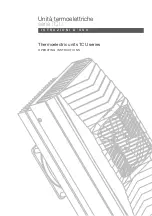
9
SM2204 - SM2206 - SM2208
0525-M005-2-P1
1.5 Blocco di emergenza
Questo tipo di blocco interviene in caso di:
- rottura di un interruttore di prossimità induttivo (proximity)
- blocco dei motori
- malfunzionamento di qualunque tipo che impedisca la
manovra di riallineo dei carrelli.
1.6 Manovre permesse in condizioni di emergenza
- Se occorresse togliere il veicolo dal ponte, quando il sollevatore
si trova in condizione di emergenza (vedi paragrafi precedenti),
è possibile far scendere singolarmente ciascuna colonna in
sequenza (vedi paragrafo 7.10).
1.7 Arresto usura chiocciole
Utilizzando il sollevatore oltre il limite di usura come indicato al
par. 9.3 si avrà l’intervento dell’arresto usura chiocciola.
L’intervento del dispositivo consente la discesa del carico ma
imp
edisce il sollevamento.
1.8 Arresto per ostacolo
Nel caso in cui il carrello incontri un ostacolo che ne impedisce
la discesa, si avrà l’intervento dell’arresto per ostacolo.
L’intervento del dispositivo consente la salita del carico ma
impedisce la discesa.
Attenzione: il sollevatore scarica sull’ostacolo tutto il carico
presente sulla forca.
1
1.5 Emergency block
This type of block occurs in the case of:
- breakage of the inductive proximity switch
- motor block
- any malfunctioning preventing carriage height
synchronisation.
1.6 Manoeuvres permitted in emergency conditions
- Each post can be lowered in sequence (see paragraph 7.10)
in order to remove the vehicle from the lift, when the lift is in the
emergency state (see previous paragraphs).
1.7 Nut wear stop
If the lift is operated even beyond the wear limit (see paragraph
9.3), the nut wear stop becomes operative. This intervention
allows to move down the charge but, afterwards, the carriage
lifting will not be possible.
1.8 Obstacle stop
Should the carriage meet an obstacle preventing the relevant
downward movement, the lift obstacle stop will become opera-
tive. This intervention allows to move up the charge but,
afterwards, the carriage lowering will not be possible.
Caution: the whole charge present on the fork will be
transmitted to the obstacle.
1.5 Not-Aus
Not-Aus-Abschaltung bei:
- Bruch eines Schalters im Bereich des
Annäherungssensors (Proximity)
- Anhalten der Motoren
- Jeglicher Art von Fehlfunktion, welche die
Gleichlaufregelung der Hubwagen behindert.
1.6 Bei Not-Aus zugelassene Bewegungen
- Ist das Fahrzeug bei Not-Aus der Hebebühne (siehe
vorhergehende Abschnitte) auf den Boden zu bringen, kann
jede Säule der Reihe nach einzeln (siehe Abschnitt 7.10)
abgesenkt werden.
1.7 Abschaltung bei Tragmutterabnutzung
Wird die Hebebühne über die in Abschnitt 9.3 angegebene
Grenze hinaus benutzt, greift die Sicherheitseinrichtung für die
Tragmutterabnutzung ein. Bei Eingriff dieser Vorrichtung kann
die Last abgesenkt aber nicht gehoben werden.
1.8 Abschaltung bei Hindernis
Stößt der Hubwagen auf ein Hindernis, welches dessen
Herunterfahren verhindert, greift die Hindernis-Vorrichtung ein.
Bei Eingriff dieser Vorrichtung kann die Last gehoben aber nicht
abgesenkt werden.
Achtung: Die Hebebühne lässt die gesamte auf der Gabel
stützende Last auf das Hindernis aus.
1.5 Bloqueo de emergencia
Este tipo de bloqueo interviene en caso de:
- rotura de un interruptor de proximidad inductivo
(proximity)
- bloqueo de los motores
- Todo tipo de funcionamiento incorrecto que impida la maniobra
de alineado de los carros.
1.6 Maniobras admitidas en condiciones de emergencia
- Si resulta necesario quitar el vehículo del puente, cuando el
elevador se encuentra en condiciones de emergencia (con-
sultar párrafos anteriores), es posible proceder con el descenso
individual de cada columna en secuencia (consultar párrafo
7.10).
1.7 Parada desgaste tornillos patrones
Utilizando el elevador con un límite de desgaste superior a lo
indicado en el párrafo 9.3 se verificará la intervención de la
parada desgaste tornillo patrón.
La intervención del dispositivo permite la bajada de la carga
pero impide la subida.
1.8 Parada por obstáculo
Si el carro encuentra un obstáculo que impide su bajada, se
activará la parada por obstáculo.
La intervención del dispositivo permite la subida de la carga
pero impide la bajada.
Atención: el elevador descarga en el obstáculo toda la carga
presente en la horquilla.
1.5 Arrêt d’urgence
Ce type d’arrêt intervient en cas de:
- rupture d’un interrupteur de proximité à induction
(proximity)
- arrêt des moteurs
- mauvais fonctionnement de toute nature empêchant la
manœuvre de réalignement des chariots.
1.6 Manœuvres autorisées en conditions d’urgence
- En cas de nécessité enlever le véhicule du pont, lorsque
l’élévateur se trouve en condition d’urgence (voir paragraphes
précédents), il est possible de faire descendre individuellement
chaque colonne l’une après l’autre (voir paragraphe 7.10).
1.7 Arrêt usure écrou
En cas d’utilisation du pont élévateur au-delà de la limite d’usu-
re, voir paragraphe 9.3, le dispositif d’arrêt usure écrou intervient.
L’intervention du dispositif permet la descente de la charge
mais empêche le levage.
1.8 Arrêt à cause d’un obstacle
Si le chariot rencontre un obstacle qui empêche sa descente,
le dispositif d’arrêt correspondant intervient.
Cette intervention permet la montée du chariot mais empêche
sa descente.
Attention: l’élévateur décharge toute la charge présente sur
la fourche sur l’obstacle.
Summary of Contents for SM2204
Page 12: ...12 SM2204 SM2206 SM2208 0525 M005 2 P1 2 Kg 4000...
Page 22: ...22 SM2204 SM2206 SM2208 0525 M005 2 P1 1 2 3...
Page 24: ...24 SM2204 SM2206 SM2208 0525 M005 2 P1 4 1 2 3 9 7 NOT AUS 5 8 4 6 6...
Page 28: ...28 SM2204 SM2206 SM2208 0525 M005 2 P1 6 Q R1 R1 Q 4650 kg R1 2000 kg...
Page 44: ...44 SM2204 SM2206 SM2208 0525 M005 2 P1 7...
Page 46: ...46 SM2204 SM2206 SM2208 0525 M005 2 P1 B A B 7...
Page 50: ...50 SM2204 SM2206 SM2208 0525 M005 2 P1 7...
Page 58: ...58 SM2204 SM2206 SM2208 0525 M005 2 P1 9 1 2...










































